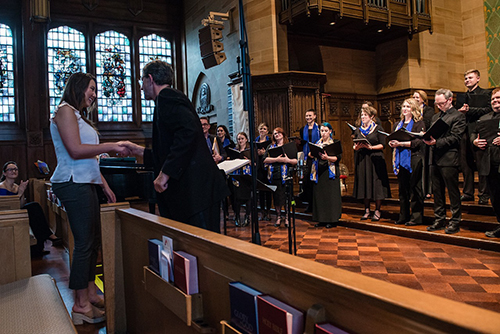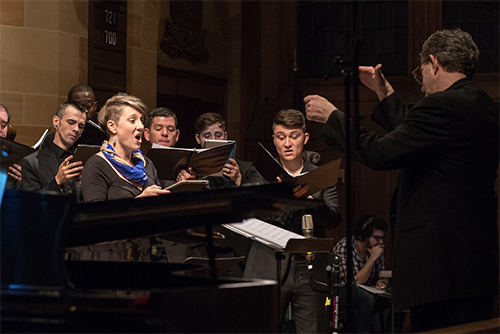by David Kulma

Bookending the first half were two works by women. Abbie Betinis’s rambunctious Long Time Trav’ling (2005) took three shape-note hymns and arranged them as vigorous solos sung by tenors Benjamin Hayes and Joel Kincannon amid a din of boisterous a cappella. Cecilia McDowall’s Night Flight (2012), on a text by Sheila Bryer, juxtaposes cello and choir to describe the first female flight across the English Channel. Featuring the robust yet singing high register of cellist Maria Flórez Areiza, the impressive three-movement work received an expansive, drama-filled performance.
In between were four works from the Guild. William F. Rayer’s My Cell Phone (2019) humorously explores the work’s subtitle, A day in the life of a cell phone. Pianist Karen Prasser deftly handled the sprightly quartal writing as the Chamber Choir sang for help and Jenna Hall Tucker wonderfully deadpanned the iPhone’s Siri.
Oberlin student Natsumi Osborn (below) won this season’s Composers Guild Collegiate Composition Contest. Her Autumn Reflections (2017) sets her friend Anabelle Clark’s poem October Danger. She lovingly captured the metaphors of wind and leaves, ending with an effective sh.

Two works by guild composers setting poetry by Robert Frost and Emily Dickinson opened the second half. Dawn Sonntag’s lovely The Road Not Taken (2019) was generously contemplative, while Scott Michal’s enjoyable “Hope” is the thing with feathers (2019) brought out the optimism in the text. Two movements from Jennifer Conner’s peace-oriented Nation’s Prayer (2008) — “Requiem” and “Dies Irae” — mixed Latin with selections from the King James Bible in a calm, beautiful musical package with clarion solos from soprano Kristine Caswelch.
Judith Bingham’s The Drowned Lovers (1998, revised 2009) led straight into The Bluebird, a choral classic by Charles Villiers Stanford. Anchored by a solo from the engaging mezzo-soprano Kira McGirr (below), Bingham’s work juxtaposes the original poem by Mary Elizabeth Coleridge with her own text on a couple drowning. The results under MacPherson’s hands were dazzling.

A delightful encore brought Flórez back for the second of Anton Arensky’s Three Quartets, Op. 57, ending the evening with gorgeous harmony in Russian.
Published on ClevelandClassical.com May 28, 2019.
Click here for a printable copy of this article


